Employer-Employee Relations Report: Case Studies Analysis
VerifiedAdded on 2022/10/11
|5
|707
|13
Report
AI Summary
This report analyzes employer-employee relations by assessing the bargaining power of employers versus unions in three distinct scenarios: Grocery-Zone, Power Company, and ChemicalCorp. The Grocery-Zone case highlights the employer's stronger position due to intense market competition and unionization among competitors, making wage increases detrimental. The Power Company scenario reveals greater union power due to customized services, limited competition, and plant-specific bargaining. Finally, the ChemicalCorp case examines the increasing role of unions in a capital-intensive industry, driven by rising competition and the need for collective bargaining to address employee wages and benefits amid strike pressures. The report uses references to support its analysis of these scenarios.
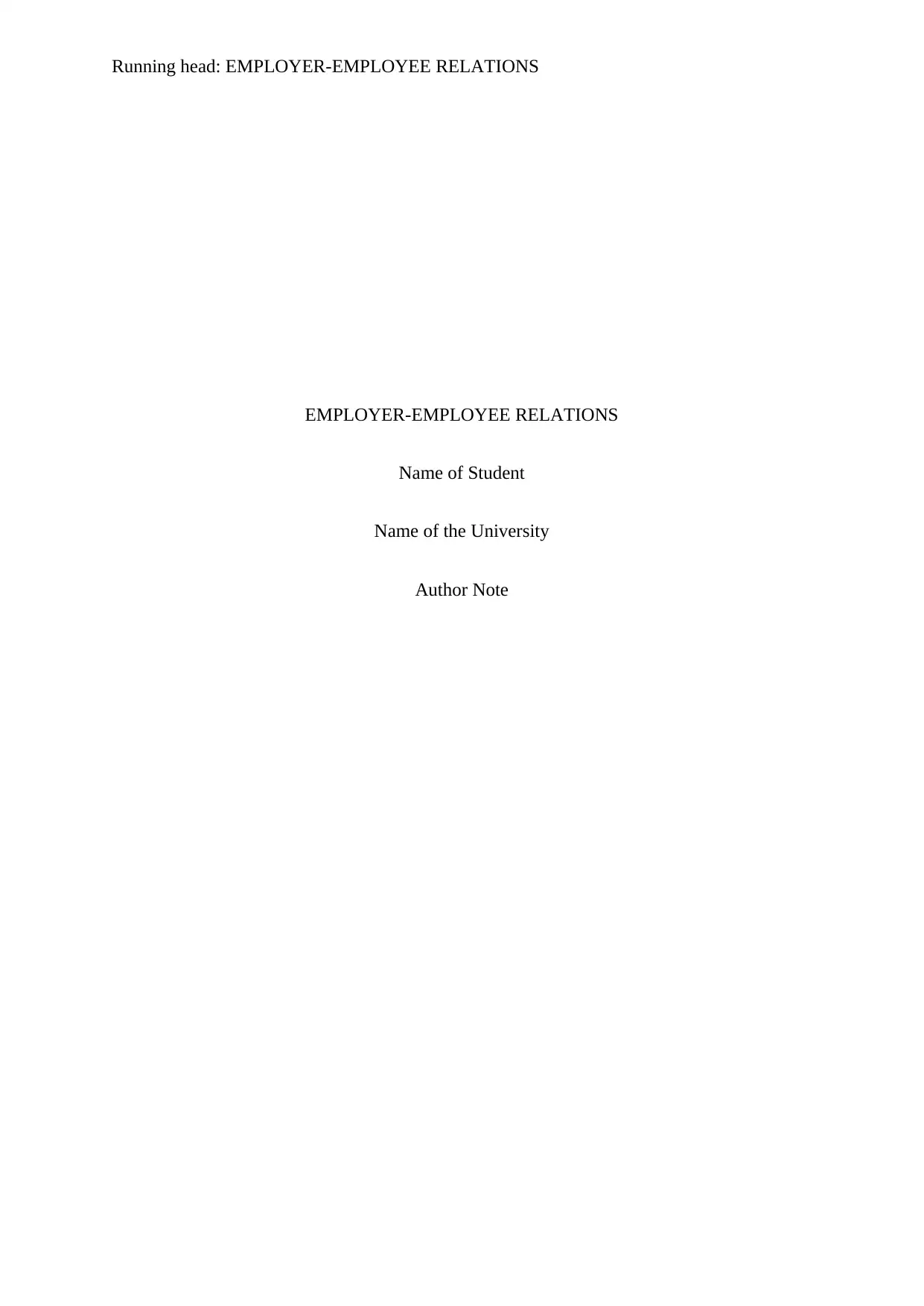
Running head: EMPLOYER-EMPLOYEE RELATIONS
EMPLOYER-EMPLOYEE RELATIONS
Name of Student
Name of the University
Author Note
EMPLOYER-EMPLOYEE RELATIONS
Name of Student
Name of the University
Author Note
Paraphrase This Document
Need a fresh take? Get an instant paraphrase of this document with our AI Paraphraser
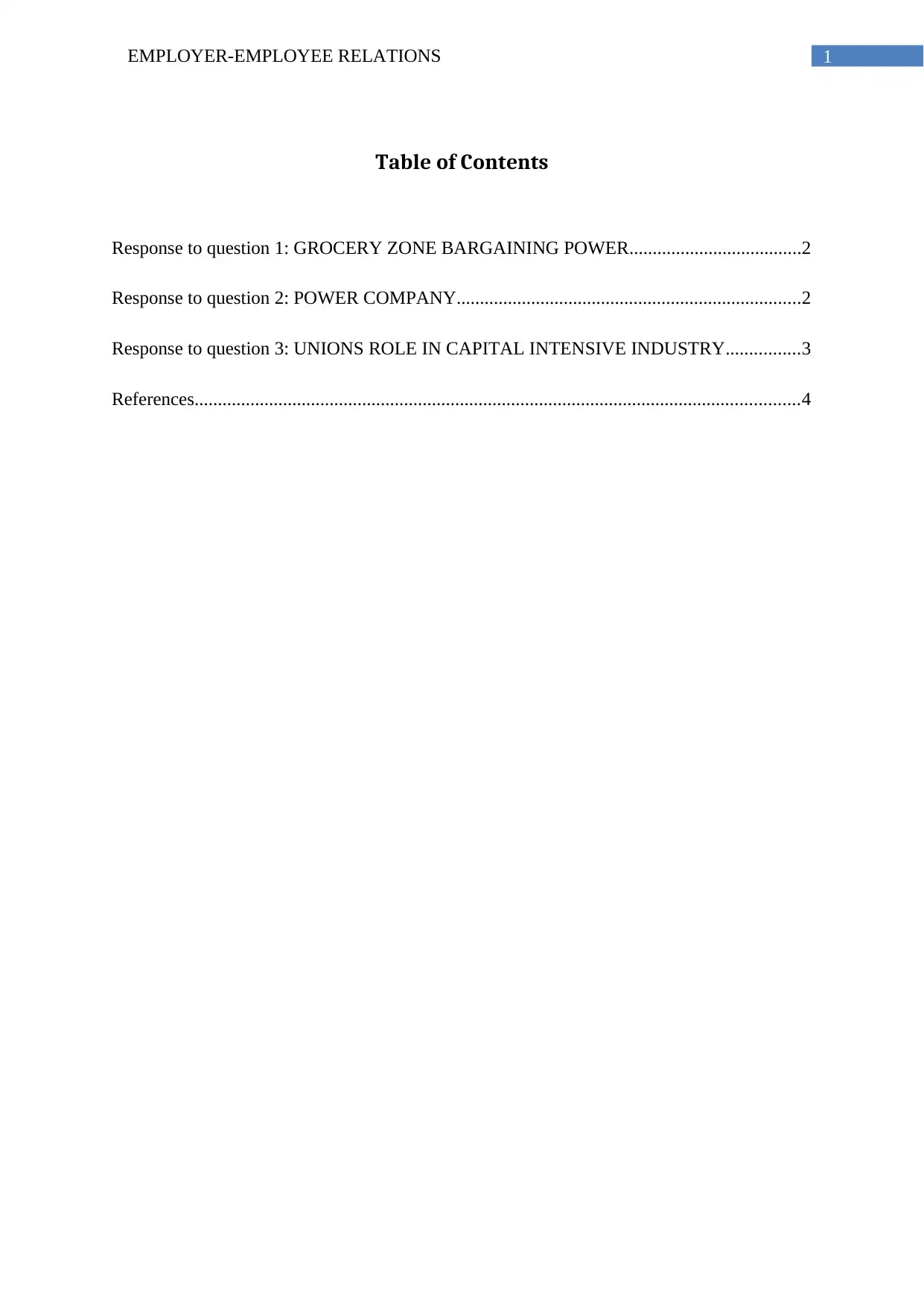
1EMPLOYER-EMPLOYEE RELATIONS
Table of Contents
Response to question 1: GROCERY ZONE BARGAINING POWER.....................................2
Response to question 2: POWER COMPANY..........................................................................2
Response to question 3: UNIONS ROLE IN CAPITAL INTENSIVE INDUSTRY................3
References..................................................................................................................................4
Table of Contents
Response to question 1: GROCERY ZONE BARGAINING POWER.....................................2
Response to question 2: POWER COMPANY..........................................................................2
Response to question 3: UNIONS ROLE IN CAPITAL INTENSIVE INDUSTRY................3
References..................................................................................................................................4
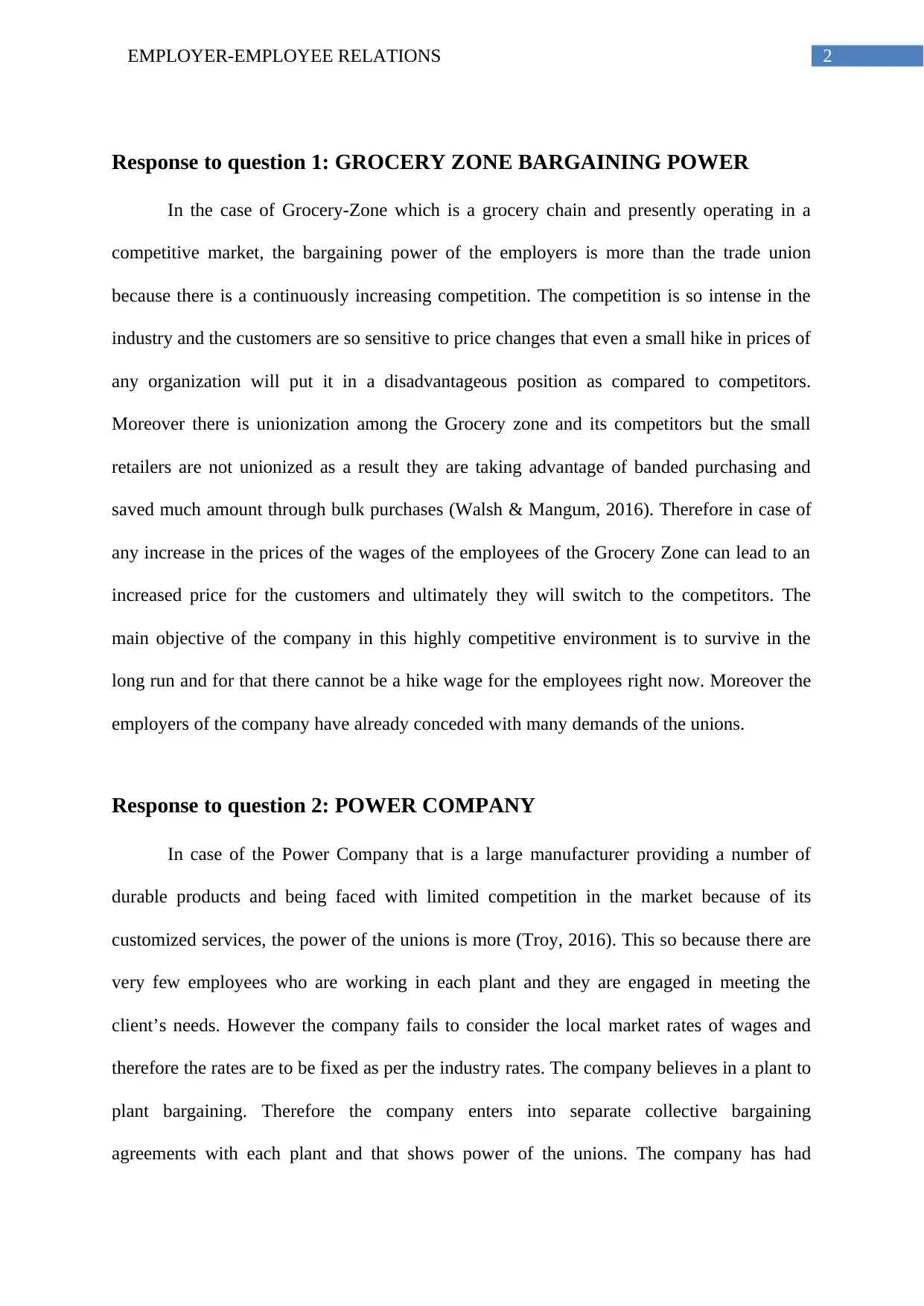
2EMPLOYER-EMPLOYEE RELATIONS
Response to question 1: GROCERY ZONE BARGAINING POWER
In the case of Grocery-Zone which is a grocery chain and presently operating in a
competitive market, the bargaining power of the employers is more than the trade union
because there is a continuously increasing competition. The competition is so intense in the
industry and the customers are so sensitive to price changes that even a small hike in prices of
any organization will put it in a disadvantageous position as compared to competitors.
Moreover there is unionization among the Grocery zone and its competitors but the small
retailers are not unionized as a result they are taking advantage of banded purchasing and
saved much amount through bulk purchases (Walsh & Mangum, 2016). Therefore in case of
any increase in the prices of the wages of the employees of the Grocery Zone can lead to an
increased price for the customers and ultimately they will switch to the competitors. The
main objective of the company in this highly competitive environment is to survive in the
long run and for that there cannot be a hike wage for the employees right now. Moreover the
employers of the company have already conceded with many demands of the unions.
Response to question 2: POWER COMPANY
In case of the Power Company that is a large manufacturer providing a number of
durable products and being faced with limited competition in the market because of its
customized services, the power of the unions is more (Troy, 2016). This so because there are
very few employees who are working in each plant and they are engaged in meeting the
client’s needs. However the company fails to consider the local market rates of wages and
therefore the rates are to be fixed as per the industry rates. The company believes in a plant to
plant bargaining. Therefore the company enters into separate collective bargaining
agreements with each plant and that shows power of the unions. The company has had
Response to question 1: GROCERY ZONE BARGAINING POWER
In the case of Grocery-Zone which is a grocery chain and presently operating in a
competitive market, the bargaining power of the employers is more than the trade union
because there is a continuously increasing competition. The competition is so intense in the
industry and the customers are so sensitive to price changes that even a small hike in prices of
any organization will put it in a disadvantageous position as compared to competitors.
Moreover there is unionization among the Grocery zone and its competitors but the small
retailers are not unionized as a result they are taking advantage of banded purchasing and
saved much amount through bulk purchases (Walsh & Mangum, 2016). Therefore in case of
any increase in the prices of the wages of the employees of the Grocery Zone can lead to an
increased price for the customers and ultimately they will switch to the competitors. The
main objective of the company in this highly competitive environment is to survive in the
long run and for that there cannot be a hike wage for the employees right now. Moreover the
employers of the company have already conceded with many demands of the unions.
Response to question 2: POWER COMPANY
In case of the Power Company that is a large manufacturer providing a number of
durable products and being faced with limited competition in the market because of its
customized services, the power of the unions is more (Troy, 2016). This so because there are
very few employees who are working in each plant and they are engaged in meeting the
client’s needs. However the company fails to consider the local market rates of wages and
therefore the rates are to be fixed as per the industry rates. The company believes in a plant to
plant bargaining. Therefore the company enters into separate collective bargaining
agreements with each plant and that shows power of the unions. The company has had
⊘ This is a preview!⊘
Do you want full access?
Subscribe today to unlock all pages.

Trusted by 1+ million students worldwide
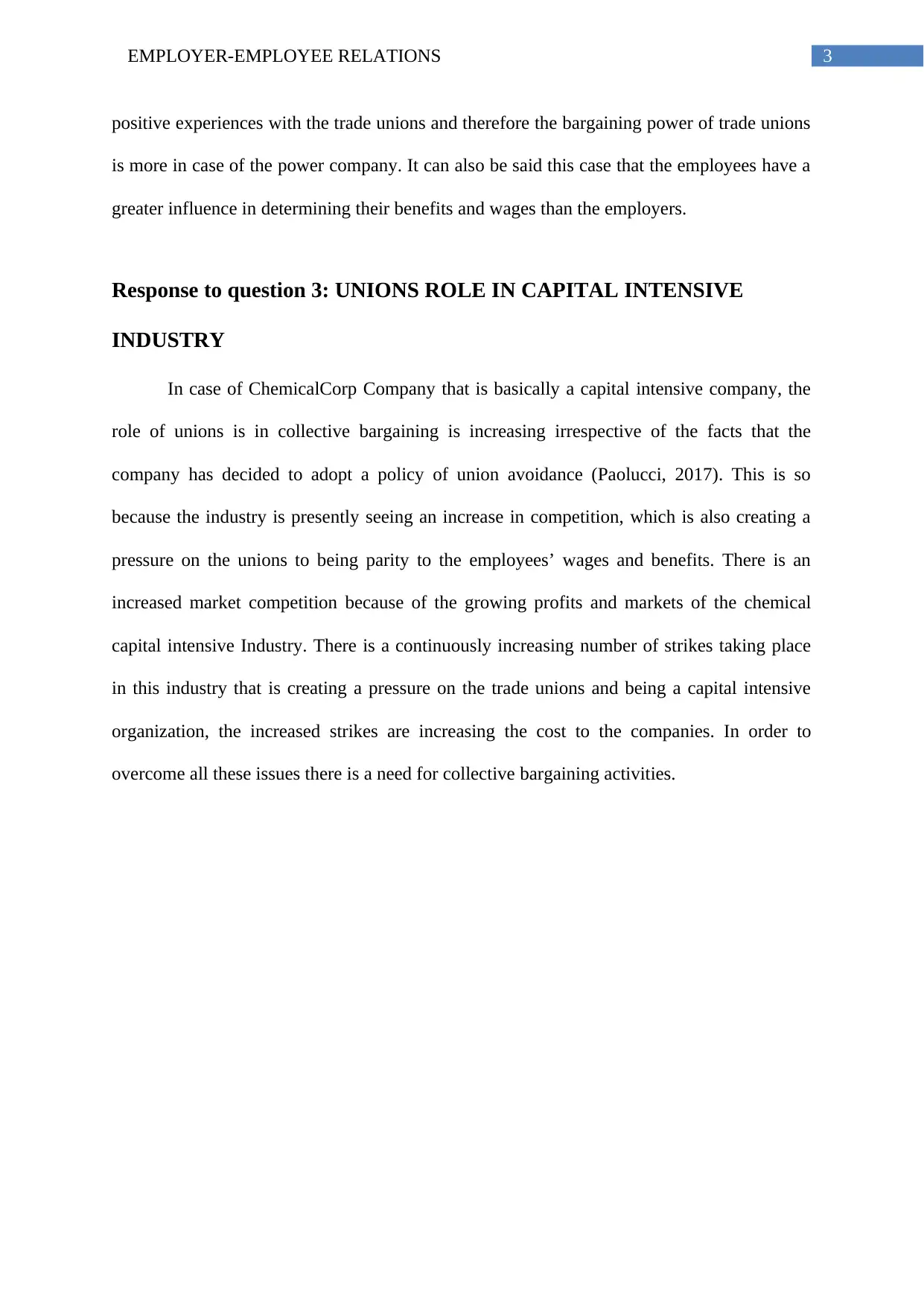
3EMPLOYER-EMPLOYEE RELATIONS
positive experiences with the trade unions and therefore the bargaining power of trade unions
is more in case of the power company. It can also be said this case that the employees have a
greater influence in determining their benefits and wages than the employers.
Response to question 3: UNIONS ROLE IN CAPITAL INTENSIVE
INDUSTRY
In case of ChemicalCorp Company that is basically a capital intensive company, the
role of unions is in collective bargaining is increasing irrespective of the facts that the
company has decided to adopt a policy of union avoidance (Paolucci, 2017). This is so
because the industry is presently seeing an increase in competition, which is also creating a
pressure on the unions to being parity to the employees’ wages and benefits. There is an
increased market competition because of the growing profits and markets of the chemical
capital intensive Industry. There is a continuously increasing number of strikes taking place
in this industry that is creating a pressure on the trade unions and being a capital intensive
organization, the increased strikes are increasing the cost to the companies. In order to
overcome all these issues there is a need for collective bargaining activities.
positive experiences with the trade unions and therefore the bargaining power of trade unions
is more in case of the power company. It can also be said this case that the employees have a
greater influence in determining their benefits and wages than the employers.
Response to question 3: UNIONS ROLE IN CAPITAL INTENSIVE
INDUSTRY
In case of ChemicalCorp Company that is basically a capital intensive company, the
role of unions is in collective bargaining is increasing irrespective of the facts that the
company has decided to adopt a policy of union avoidance (Paolucci, 2017). This is so
because the industry is presently seeing an increase in competition, which is also creating a
pressure on the unions to being parity to the employees’ wages and benefits. There is an
increased market competition because of the growing profits and markets of the chemical
capital intensive Industry. There is a continuously increasing number of strikes taking place
in this industry that is creating a pressure on the trade unions and being a capital intensive
organization, the increased strikes are increasing the cost to the companies. In order to
overcome all these issues there is a need for collective bargaining activities.
Paraphrase This Document
Need a fresh take? Get an instant paraphrase of this document with our AI Paraphraser
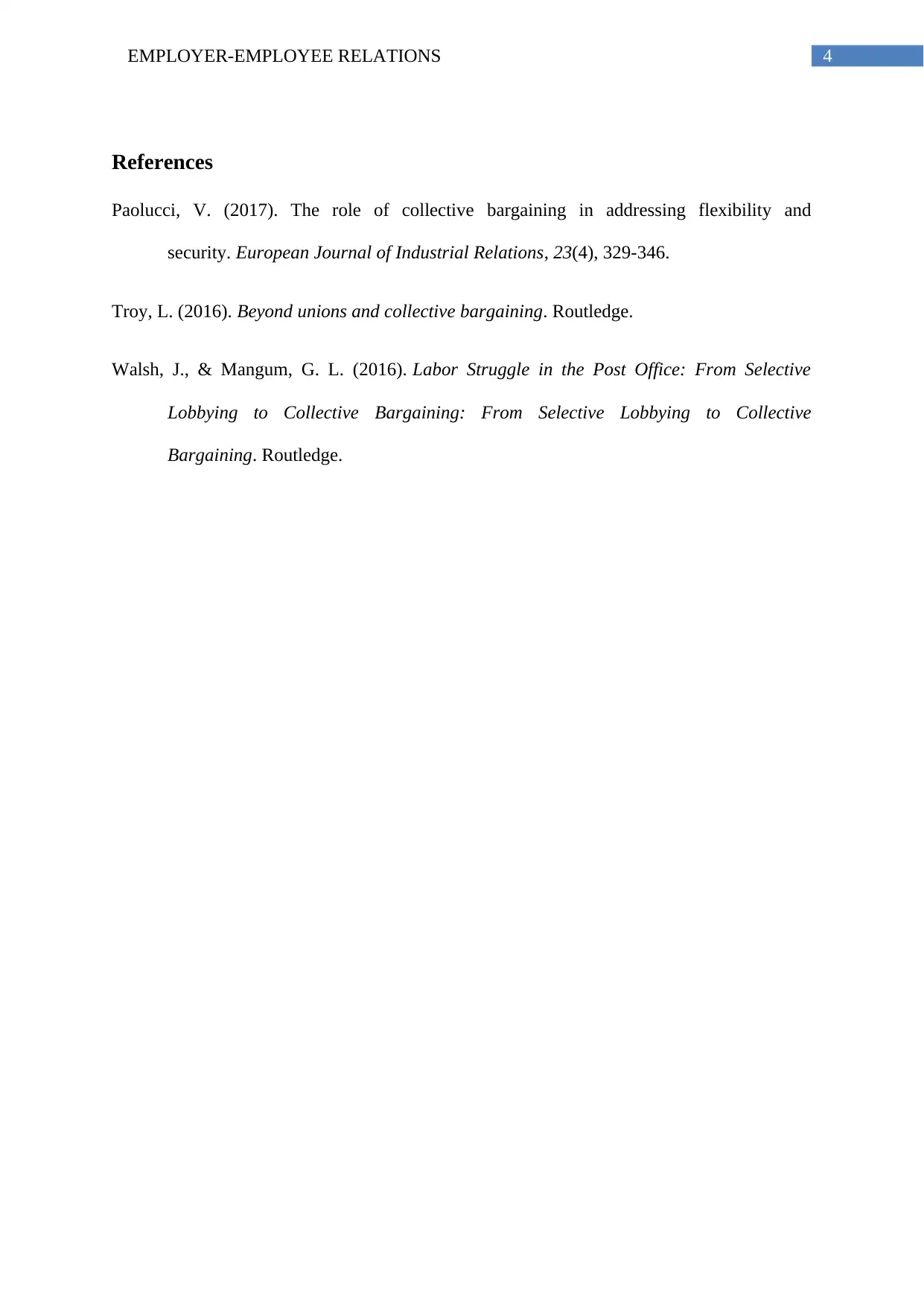
4EMPLOYER-EMPLOYEE RELATIONS
References
Paolucci, V. (2017). The role of collective bargaining in addressing flexibility and
security. European Journal of Industrial Relations, 23(4), 329-346.
Troy, L. (2016). Beyond unions and collective bargaining. Routledge.
Walsh, J., & Mangum, G. L. (2016). Labor Struggle in the Post Office: From Selective
Lobbying to Collective Bargaining: From Selective Lobbying to Collective
Bargaining. Routledge.
References
Paolucci, V. (2017). The role of collective bargaining in addressing flexibility and
security. European Journal of Industrial Relations, 23(4), 329-346.
Troy, L. (2016). Beyond unions and collective bargaining. Routledge.
Walsh, J., & Mangum, G. L. (2016). Labor Struggle in the Post Office: From Selective
Lobbying to Collective Bargaining: From Selective Lobbying to Collective
Bargaining. Routledge.
1 out of 5
Related Documents
Your All-in-One AI-Powered Toolkit for Academic Success.
+13062052269
info@desklib.com
Available 24*7 on WhatsApp / Email
![[object Object]](/_next/static/media/star-bottom.7253800d.svg)
Unlock your academic potential
Copyright © 2020–2026 A2Z Services. All Rights Reserved. Developed and managed by ZUCOL.




